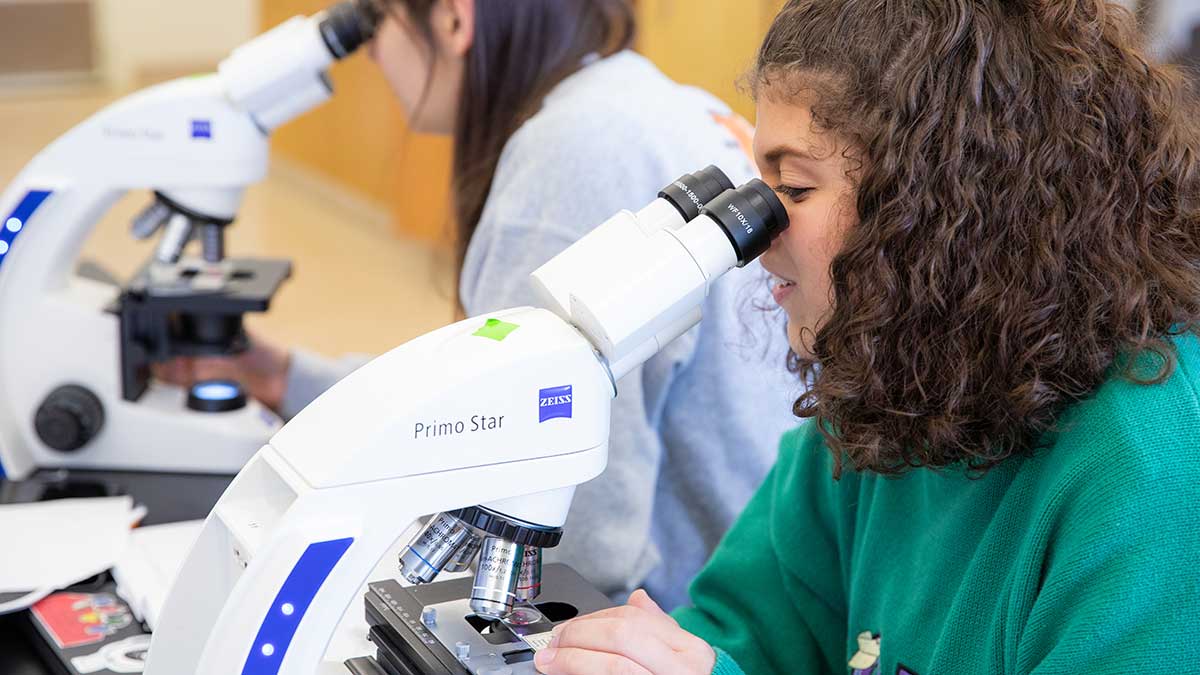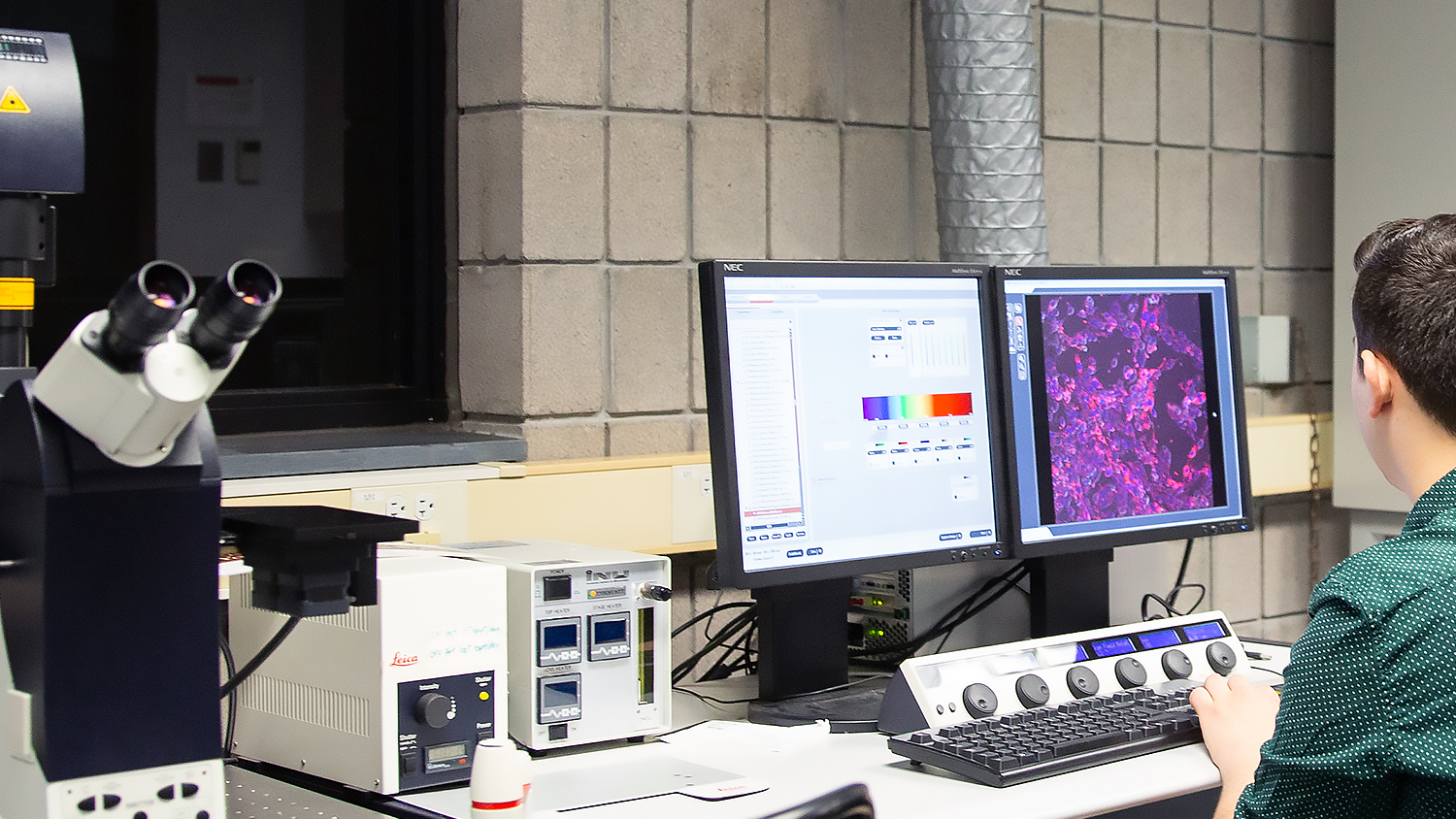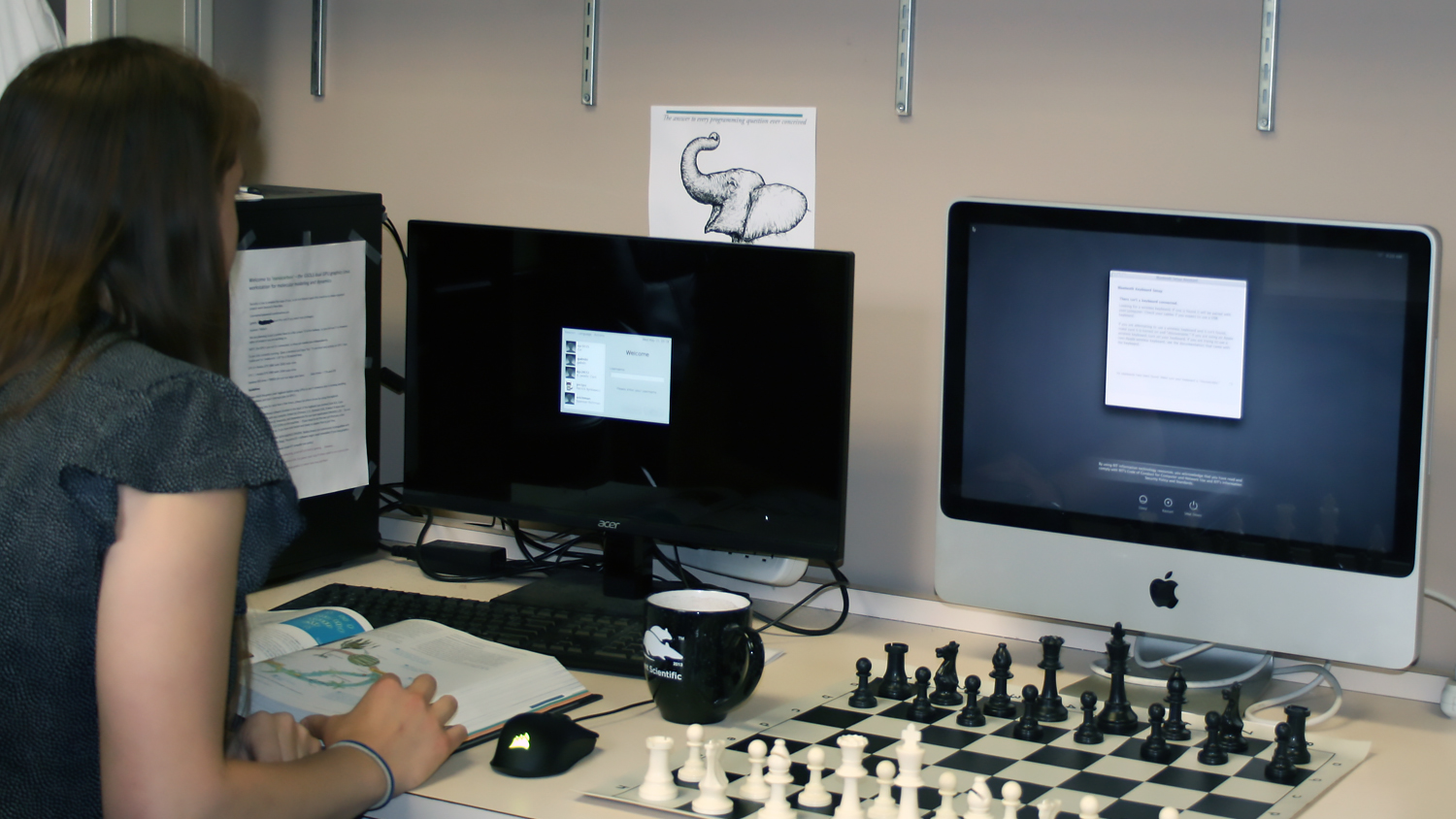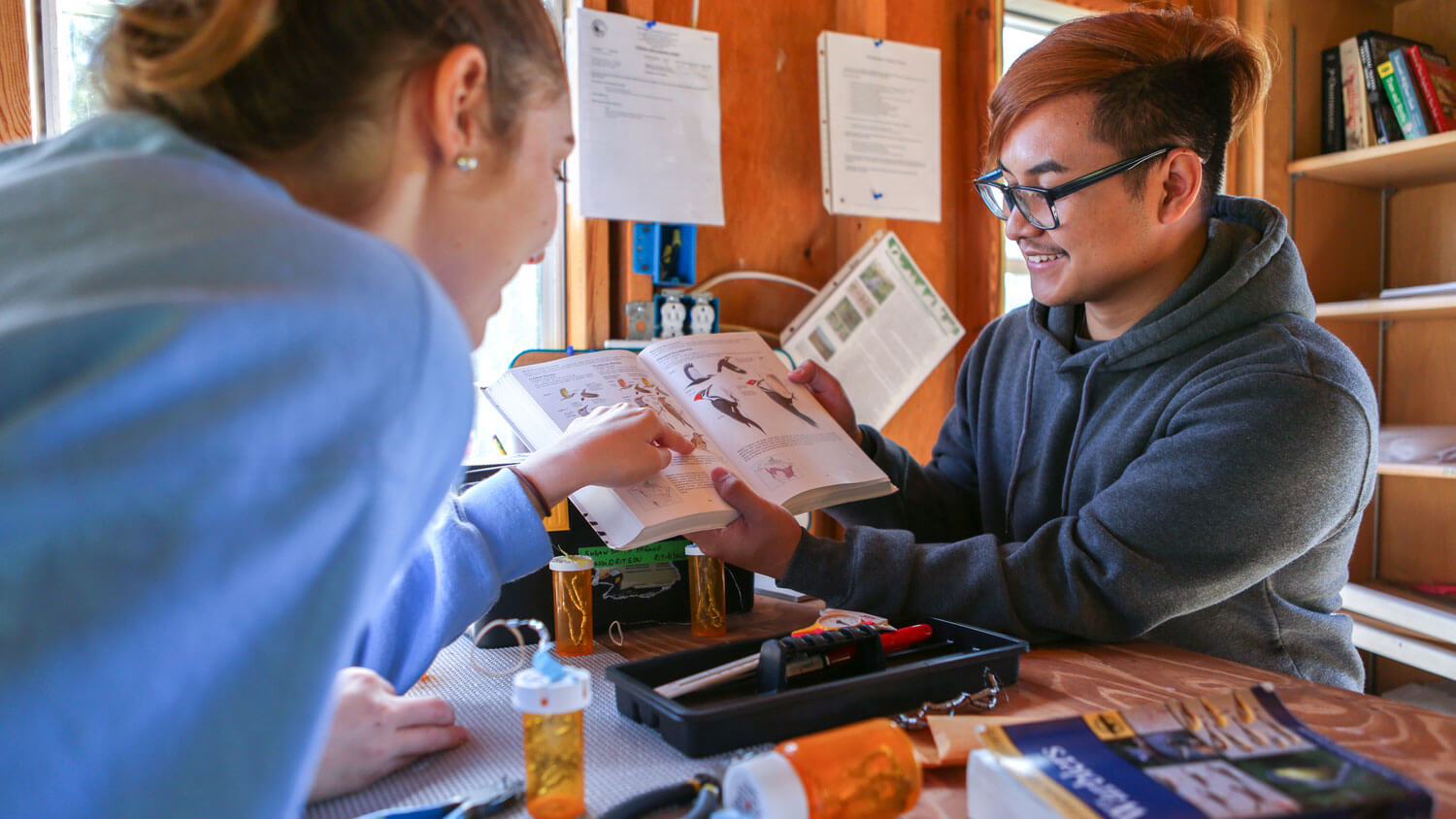Thomas H. Gosnell School of Life Sciences

Thomas H. Gosnell School of
Life Sciences
- RIT/
- College of Science/
- Academics/
- Schools and Centers/
- Thomas H. Gosnell School of Life Sciences
Explore biological and environmental phenomena from biomolecules all the way up to dynamic ecosystems while using cutting-edge technology and computational tools to support research and tackle complex problems.
Overview
As a student in the Thomas H. Gosnell School of Life Sciences, you will be immersed in active-engagement classrooms and participate in exciting hands-on laboratory and field exercises to become the next generation of researchers, environmental stewards, policymakers, medical doctors, veterinarians, wildlife biologists, pharmacists, bioinformaticians and so much more!
Good to Know
- Bioinformatics and Computational Biology majors integrate concepts from biology, statistics, and computer science to analyze "big data" and gain deeper insights into the natural world, from personalized medicine to microbial diversity and evolutionary processes.
- Biology majors explore the study of life, from molecules and cells to organisms and ecosystems, through extensive laboratory and field courses, making it an excellent choice for those preparing for medical, veterinary, or pharmacy school.
- Biotechnology and Molecular Bioscience majors delve into the world of molecules and microbes, learning how they communicate, respond to stressors, and can be manipulated for applications in genetics, agriculture, conservation biology, and more, through cutting-edge laboratory techniques.
- Environmental Science majors immerse themselves in the interdisciplinary study of the natural world, combining science, field work, statistics, and policy to understand the impact of human actions and climate change on the delicate environmental balance, with opportunities to explore wetlands, chemical pollutants, and GIS technology for land management.
70%
Of upper-level courses have a fully hands-on, in-depth laboratory component
92%
Of all courses are taught by full-time professors
1st
RIT was first in the nation to offer a Bachelor of Science in biotechnology
Latest News
-
November 12, 2025

Stefan Schulze’s lab aims to build the foundation for new biomedical treatments
Backed by an award from the National Institutes of Health, Assistant Professor Stefan Schulze is using his expertise in the structure and function of proteins to work with a bacterial pathogen commonly associated with antibiotic resistance.
-
November 11, 2025

RIT Tiger creates career caring for carnivores
Lions, tigers, and bears—that’s the everyday reality for Seneca Park Zookeeper Brenna De Angelis ’16 (biology), a Rochester native who now works with the animals she grew up visiting.
-
November 5, 2025

Plastic in Our Water – with Dr. Christy Tyler
Christy Tyler, professor in the Thomas H. Gosnell School of Life Sciences, is featured on KPFA's Green Street podcast talking about her work uncovering the sources of plastic pollution that end up in our water.
Research
Discipline-Based Education Research (DBER) is a scholarly field that combines disciplinary expertise in a STEM field (physics, chemistry, biology, etc.) with research methods from cognitive science, psychology and the learning sciences. Researchers in this field are interested in studying and transforming STEM Education through basic and applied research. Faculty in the Thomas H. Gosnell School of Life Sciences are exploring how students learn concepts in molecular biology and genetics and how students apply their knowledge to novel learning and assessment tasks. Gaining insight into students’ mental models of complex molecular processes allows the team to develop new assessments and activities to measure and improve student learning. Faculty are also investigating how newly developed 3-D models of biomolecules and molecular processes can help students learn concepts related to genetic information flow.
Research Active Faculty:
Current work in the Thomas H. Gosnell School of Life Sciences uses Next Generation Sequencing to elucidate genomic and proteomics aspects of phage, bacteria and plants as it relates to pathogenesis, resistance, metabolic engineering, etc.
Research Active Faculty:
Featured Work and Profiles
-
How an RIT Biology Degree Led to a Dream Job at Seneca Park Zoo
Brenna De Angelis '16 (biology) turned her passion for wildlife into a career as a carnivore keeper at Seneca Park Zoo. After earning a biology degree and completing internships, she now cares for...
Read More about How an RIT Biology Degree Led to a Dream Job at Seneca Park Zoo -
Transforming Genomic Data into Cancer Insight
RIT alum Spencer Richman ’20 uses computing and biology to build software that transforms genomic data into tools for cancer detection, helping bridge data and discovery in healthcare.
Read More about Transforming Genomic Data into Cancer Insight -
Field Course Sparks a Passion for a Freshwater Science Career
Alexandra Bros ’22 turned early concerns about water pollution into a passion for field research at RIT leading her from the Lacawac Sanctuary to a Ph.D. program in limnology.
Read More about Field Course Sparks a Passion for a Freshwater Science Career -
Tackling the Macro Problem of Microplastics
Environmental science students team up with professors to research the impact microplastics have on the ecosystem and human health.
Read More about Tackling the Macro Problem of Microplastics -
RIT Co-op Experience Paves Way for Thriving Pharmaceutical Career
Sayali Kadam ’10 turned co-op experiences into a thriving career at Merck! Now Director of Launch Strategy and Operations, she credits RIT's hands-on learning for her success.
Read More about RIT Co-op Experience Paves Way for Thriving Pharmaceutical Career -
From RIT Labs to Life-Saving Cancer Research at AstraZeneca
Dylan Weil ‘15 utilizes his RIT biotechnology lab skills to conduct life-saving cancer immunotherapy research at AstraZeneca.
Read More about From RIT Labs to Life-Saving Cancer Research at AstraZeneca
Undergraduate Programs
At the Thomas H. Gosnell School of Life Sciences we offer four exciting undergraduate programs. Whether it’s biology, biotechnology, bioinformatics, or environmental science, you become part of an active community of students, staff, and faculty working together to explore and solve complex biological problems in state-of-the-art teaching and research facilities.
In this dynamic bioinformatics BS, biology and computing combine to analyze big data collected by the health industry to discover, diagnose, and treat a wide range of medical conditions.
Learn more about the Bioinformatics and Computational Biology BS programRIT’s biology BS prepares you for careers in research, biotech, conservation, and health fields through hands-on lab and field work.
Learn more about the Biology BS programIn RIT’s biotechnology bachelor’s degree you’ll develop technologies for genetics, agriculture, pharmaceuticals, vaccine development, energy/ environment, forensics, and more.
Learn more about the Biotechnology and Molecular Bioscience BS programCreate a sustainable future for our planet in this innovative bachelor’s degree in environmental science, where you’ll combine a love for nature with cutting-edge research.
Learn more about the Environmental Science BS programGraduate Programs
The graduate students in the Thomas H. Gosnell School of Life Sciences apply their advanced training in environmental science and computational biology to take a deep dive into the complexities and nuances of biological issues facing the world today. Each student works with a chosen faculty advisor to help them approach their project from a novel perspective, which prepares them to succeed in any path they choose after graduation.
A bioinformatics master’s degree prepares you to tackle complex problems in biology using big data, data mining, machine learning and modeling.
Learn more about the Bioinformatics MS programAn environmental science master’s degree that balances environmental conservation, human well-being, and economic development to tackle the biggest problems plaguing our environment.
Learn more about the Environmental Science MS programMinors and Immersions
Current students are encouraged to visit the Student Information System (SIS) to confirm any pre-requisite or co-requisite courses.
The bioinformatics analysis minor immerses students in the core challenges and strengths of the field of bioinformatics, as well as the ethical issues involved. Students gain hands-on experience implementing some of the core algorithms utilized by professionals in the field.
Learn more about the Bioinformatics Analysis Minor programThe biology: cellular and molecular immersion provides students with the opportunity to experience courses in modern cell and molecular biology. Students complete a foundational course in molecular biology and the accompanying laboratory course and then go on to study additional cellular and molecular biology subjects in more detail.
Learn more about the Biology: Cellular and Molecular Immersion programThe biology: cellular and molecular minor provides students with opportunities to experience and explore topics related to both the cellular and molecular aspects of modern biology to broaden and enhance their educational experience.
Learn more about the Biology: Cellular and Molecular Minor programThe biology: ecology and evolution immersion provides students with the opportunity to experience courses in ecology and evolutionary biology. Students complete a foundational course in ecology or evolution and then have a choice of electives.
Learn more about the Biology: Ecology and Evolution Immersion programThe biology: ecology and evolution minor provides students with the opportunity to experience both the ecological and evolutionary underpinnings of modern biology. The minor explores these areas of biology through laboratory and field experiences.
Learn more about the Biology: Ecology and Evolution Minor programThe environmental science minor introduces students to the complexities of environmental issues and concepts, and provides them with opportunities to further investigate many of these issues through advanced course work. Central to this minor are the development of field, analytical, and problem solving skills and an understanding of the multiple perspectives often embedded in environmental issues. Students interested in becoming citizen scientists, or those pursuing employment or an advanced degree with an environmental focus, will find this minor beneficial.
Learn more about the Environmental Science Minor programWould you like to donate to our school?
Your gift helps the university support students, attract great faculty members, and maintain leading-edge academic programs.


























